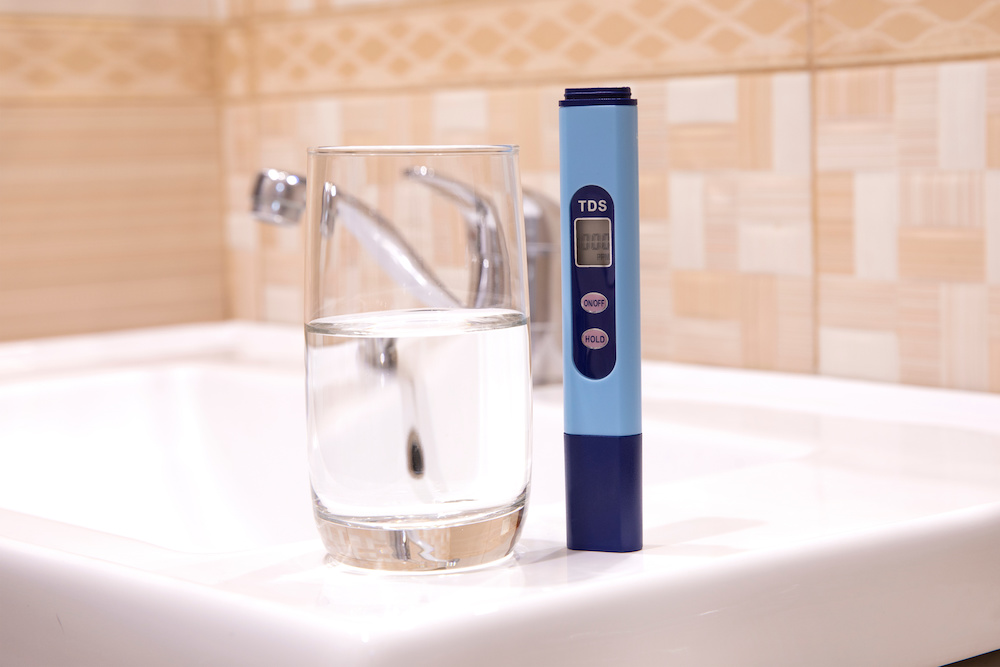With the surge in different H2O variants, you might be confused about their differences and how well they perform over the others.
Some examples of water variants are alkaline and hydrogen water. Essentially, alkaline water has higher pH levels than regular water.
On the other hand, hydrogen water is water with additional dissolved hydrogen atoms.
But how different is alkaline water vs hydrogen water? Which is better?
Let us walk you through the answers to this question by discussing their main differences, how they’re made, and why you should or shouldn’t use them.
Alkaline Water Explained
Alkaline water is normal water with little to no carbonates due to a special filtration process.
However, it retains its alkali minerals, such as magnesium, calcium, iron, and potassium, so it has a higher pH level than normal water.
Generally, alkaline water has pH levels of eight or nine, while normal water has seven.
This higher pH level also classifies alkaline water as hard water, although it’s typically milder.
With its purported benefits linked to cancer prevention and acid reflux remedies, alkaline water has become one of today’s most popular choices for drinking water.
How Do You Make Alkaline Water?
While you can make your alkaline water at home, nature has its way of making it.
Generally, bodies of freshwater that pass through rocks take some of their environment’s properties.
To be precise, water erodes nearby rocks due to constant water pressure and takes some of their alkaline minerals.
Fortunately, the alkaline water you can buy commercially or make at home is processed using a more sanitary method.
The Machine Used
Alkalizing water can be done through a machine called a water ionizer.
Essentially, water ionizers use a chemical process called electrolysis to separate alkaline water from its more acidic components.
To understand it more vividly, let’s first discuss the machine’s main components.
It has a standard water filter that ensures no debris or other contaminants can move on to the next parts.
The ion-permeable membrane, which, as the name suggests, only allows ions (molecules and atoms with strong charges) to pass through.
Then, inside the electrolysis chamber, there are two electronically charged plates: one is negatively charged while the other is positively charged.
These two will act as magnets for oppositely charged ions later.
The next main component is the two water chambers: one for the acidic water and the other for the alkaline water.
However, depending on your water ionizer’s model, the chamber for storing acidic water may not exist.
The Process
Now that you know about the main components of a water ionizer, let’s walk through the process.
First, the source water is drawn from an outside source, typically from a tap.
Then, the source water runs through the water filter and becomes free from contaminants that once rendered it undrinkable.
Afterward, the source water goes through the ion-permeable membrane, which separates carbonates (dissolved carbon dioxide ions that make the water acidic) and alkaline ions from the water.
That is because water molecules don’t have a strong charge, unlike carbonates and alkaline ions.
Next, the filtered alkaline and carbonate ions go through the electrolysis chamber.
Carbonate ions (negatively charged) become attracted to the positively charged plate. On the other hand, alkaline ions (positively charged) becomes attracted to the negatively charged plate.
The previously-neutralized source water will then go to the two water chambers.
Water on the acidic side typically gets flushed or saved for other purposes, such as plant-watering or dishwashing.
On the other hand, water on the alkaline side becomes the alkaline water you can drink.
The Benefits of Alkaline Water
Below are the reasons why you may choose to drink or use alkaline water:
Helps With Acid Reflux
Acid reflux is typically caused by drinking acidic drinks such as coffee or alcohol.
Alkaline water has higher pH levels, so it can help counteract these drinks’ effects.
That is because pepsin, the enzyme that primarily causes acid reflux, is instantly deactivated by alkaline water with a pH of 8.8.
Aids in Your Bone Health
Your bones need certain minerals to stay healthy. As you grow older, you’ll need these minerals more.
While you can source some of your mineral needs from your food intake, it wouldn’t hurt to drink mineral-rich alkaline water to help your body even more.
A 2009 study found that drinking bicarbonate-rich alkaline water significantly decreased the levels of parathyroid hormones, which are responsible for bone resorption (the process that decreases bone density and mass).
Has Anti-Oxidation Properties
As mentioned, alkaline water has positively charged ions thanks to its alkaline content. As such, it also has a negative oxidation-reduction potential (ORP), the measure of something’s ability to reduce oxygen ions.
It means that alkaline has high antioxidation properties.
But why would you want your water to be antioxidant?
Antioxidation is commonly linked to combatting free radicals, one of the leading causes of cancer and premature aging.
Drinking alkaline water reduces your chances of contracting diseases related to free radicals.

The Disadvantages of Alkaline Water
Despite its benefits for human health, alkaline water has disadvantages.
Here are some of them:
Not Advisable for Dishwashing
Alkaline water is still technically heavy water. As mentioned, it contains alkali minerals, such as calcium and magnesium, the two leading causes of water stains.
Thus, you should use normal tap water or soft water for cleaning purposes.
Moreover, due to calcium deposits that may accumulate over time, heavy water may clog or corrode your drains when used regularly.
May Irritate or Damage Skin and Hair
Mineral-rich alkaline water is also not advisable for bathing because calcium and magnesium easily bind to common soap ingredients, such as sodium lauryl sulfate (SLS) and sodium lauryl ether sulfate (SLES).
This makes it harder for you to wash it off your skin, which could cause problems, especially for people with eczema or other skin disorders.
Hydrogen Water Explained
Hydrogen water is ordinary water with added hydrogen gas.
Since the two hydrogen atoms in water are molecularly bound to one oxygen atom, the human body can’t naturally absorb all the beneficial hydrogen ions.
Therefore, adding free hydrogen ions in the water helps your body to absorb it more easily.
But how does hydrogen gas add value to conventional water?
Hydrogen is one of the most important elements known to man. It’s used for various important things such as electricity and heat generation.
However, once inside your body, hydrogen primarily keeps you hydrated and regulates your aging process (we’ll talk more about its benefits later).
In short, you can think of drinking hydrogen water as taking a food supplement.
How Do You Make Hydrogen Water?
There are various ways to make hydrogen water, but the most effective way is to let hydrogen gas bubble through drinking water.
While the process is relatively straightforward, this is typically only advisable for laboratory settings and not for DIY applications.
That is because it takes more than 30 minutes to effectively dissolve hydrogen gas in the water, thanks to its low water solubility.
What makes this problematic for DIY users is hydrogen gas is highly flammable and potentially explosive, so undissolved particles are especially dangerous when released.
Moreover, you can’t easily buy concentrated and pressurized hydrogen tanks since they’re heavily regulated for safety reasons.
An alternative and safer way to make hydrogen water is by adding hydrogen tablets to your drinking water.
Essentially, hydrogen tablets are magnesium-based tablets that chemically react to displace existing hydrogen molecules from the water.
When using raw magnesium metal, the process uses the chemical formula: Mg + 2H2O 🡪 H2 (g) + Mg(OH)2.
In simple terms, this means that adding one magnesium molecule (Mg) to two water molecules (2H2O) creates diatomic hydrogen gas (H2(g)) and magnesium hydroxide (Mg (OH)2).
However, this could lead to magnesium overdose or hypermagnesemia, so manufacturers use a similar reaction, albeit with different magnesium-based components for hydrogen tablets.
Generally, one hydrogen tablet should be enough for one glass of water, depending on the manufacturer’s instructions.
You can also use a hydrogen water machine to do the trick, but depending on the brand, this usually yields a lower hydrogen molecule per unit volume.
Like alkaline ionizers, it uses the process of electrolysis to create hydrogen-infused water.
The Benefits of Hydrogen Water
According to some claims, adding free-floating hydrogen to normal water induces therapeutic benefits, such as:
Has Antioxidant Benefits
Hydrogen is a powerful antioxidant with a well-documented list of health benefits.
A 2010 summative study details how its antioxidant properties can benefit people suffering from a weak immune system, metabolic syndrome, inflammatory diseases, neurological disorders, and allergic reactions.
These studies mainly focused on inhaling or orally ingesting concentrated diatomic hydrogen gas, precisely what is found in hydrogen-enriched water.
Moreover, hydrogen gas therapy is already approved for treating cancer and the abovementioned diseases.
This fact may relate to the efficacy of hydrogen-infused water.
Helps Ease Muscle Fatigue
Another benefit of drinking hydrogen-rich water is that it helps ease muscle fatigue.
A 2012 study among athletes found that drinking hydrogen water helped lower blood lactate levels during heavy exercises.
For context, heightened blood lactate levels during heavy exercise directly correlate with how tired the person is.
The Disadvantages of Hydrogen Water
As beneficial as hydrogen water is, it’s still not a perfect alternative to conventional drinking water. Below is one reason why.
More Expensive
Price is the most common limiting factor when choosing between alkaline or hydrogen water.
Typically, you can expect to spend around $12 for four 8oz bottles of commercial hydrogen water, while tablets may cost around $60, depending on the brand.
Moreover, hydrogen water machines can be pricey. Depending on the brand, you can expect to spend $90 for one unit.
Alkaline Water vs Hydrogen Water: Which Is Better?
Now that you know the differences between hydrogen water and alkaline water, you can choose which is the better water variant for you.
While both are safe for human consumption, consuming hydrogen water may give you more health benefits.
On the other hand, alkaline water is the more economical choice since it’s a bit cheaper.
Just remember, outside of this alkaline water vs hydrogen water debate, staying well-hydrated with your chosen variant is more important.

